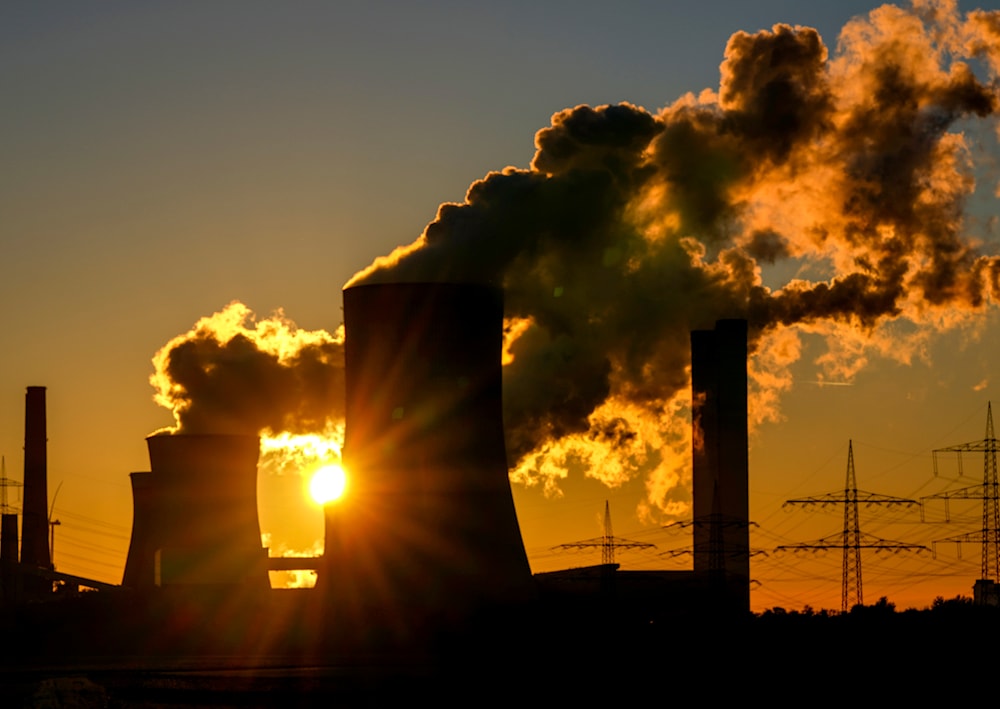Banks give $7tln to fossil fuel firms since Paris deal: Report
Leading states that met to reduce carbon emissions are home to some of the world’s top 60 banks. Among these, US banks are the largest fossil fuel financiers, while London-based Barclays leads in Europe.
-

Photo shows chimneys of the coal-fired power station in Niederaussem, Germany on Oct. 24, 2021. (AP)
Nearly $7 trillion has been handed by the world's big bank to fund the fossil fuel industry since the Paris agreement to limit carbon emissions, according to research.
After the talks in Paris in 2016, 196 countries signed an agreement to limit global heating to control carbon emissions to at most 2C above preindustrial levels, with a limit of 1.5C to prevent the impact of global warming. While countries vowed to reduce emissions, the latest research proved otherwise, revealing the private interests used to funnel money for oil, gas, and coal companies.
Eight in ten of the world's respectable climate scientists now predict that global heating will at least hit 2.5C, according to a survey by The Guardian published last week. This level is bound to have a devastating impact on the planet.
Banks of corruption
In its 15th edition, the Banking on Climate Chaos report analyzes the underwriting and lending practices of the world's top 60 banks, focusing on their financial support to over 4,200 fossil fuel companies and firms contributing to the degradation of the Amazon and Arctic.
The researchers found that these banks provided $6.9 trillion in financing to oil, coal, and gas companies, with nearly half of that amount—$3.3 trillion—allocated to fossil fuel expansion. Despite commitments to lower emissions as part of the Net Zero Banking Alliance, bank financing for fossil fuel companies in 2023 remained at $705 billion, including $347 billion dedicated to expansion, according to the report.
World's largest fossil fuel financers
According to the report, US banks were the largest financiers of the fossil fuel industry, contributing 30% of the total $705 billion provided in 2023. JP Morgan Chase was the leading financier globally, supplying $40.8 billion to fossil fuel companies in 2023, while Bank of America ranked third.
The world's second-largest financier of fossil fuels was the Japanese bank Mizuho, which provided $37.1 billion.
EU's largest fossil fuel financer
London-based Barclays was Europe’s largest fossil fuel financier, providing $24.2 billion, followed by Spain’s Santander with $14.5 billion and Germany’s Deutsche Bank with $13.4 billion. According to the report, European banks contributed just over a quarter of the total fossil fuel financing in 2023.
Climate hypocrisy, Western proxy
Rich nations have been resisting increasing their financial engagement to support West-imposed roadmaps on battling climate change, claiming that it would take time to determine whether such a fund was necessary and how it would function, according to a Politico report published last year.
Although $100 billion a year was pledged in 2009 to the UN by rich countries for developing countries under a roadmap to fight climate change, it was never upheld by the parties that announced their commitment.
Another failed scheme is a 2021 pledge by G20 members to rechannel $100 billion in IMF special drawing rights (SDR) from rich states to impoverished economies.
The Center for Global Development CGD revealed in 2022 that CO2 emissions produced by people in the West are astronomically larger than those produced by individuals in the Global South. According to a CGD study, in just the first two days of January 2022, the average UK citizen was already responsible for more carbon dioxide emissions than someone from the Democratic Republic of the Congo would produce in an entire year.
Highlighting the shocking emission gap, the report said each British citizen released 200 times the carbon of an average DRC citizen, meanwhile, a US citizen produced 585 times as much.

 4 Min Read
4 Min Read








